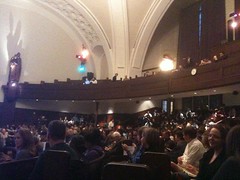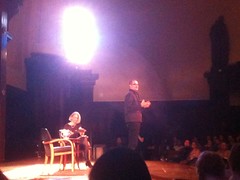Primary Audience – To Those That Want to Understand Basic Christian Theology
Secondary Audience – Skeptics, Agnostics, The “Over-Churched”
Last post asked the question, “Why does Jesus have to die?”
“Why can’t Jesus just stand in the temple and say, ‘New deal – confess you are a sinner, put your trust in me, I’ll forgive you, enjoy the abundant life right now and for all eternity?'” No blood, no cross, no need for a resurrection, So why the drama, why the violence?
Sin/Separation/Death
What escaped me was the doctrine of sin and holiness. Being raised in church, I of course knew what sin was – it was pretty much everything ;) I understood sin as any a moral failure of some sort or the fancier definitions were any thought, word, deed contrary to the will of God, etc. Then there was the because we were sinners, Jesus needed to die. Which if you walk into the story for the first time, you are not really sure why anyone really has to die. Again, why not a Messianic announcement of a “new deal”?
To understand this, I needed to understand that sin was more than simply a moral failure (or the fancier definition). I really needed to see that sin was a separation from God and death was the greatest type of separation. So sin/death was separation. How can the separation be eliminated? For years, we evangelicals drew this “chasm” between God and humankind, and used Jesus as the bridge that we could cross over. This was all well and good but for deconstructionists and newbies to the story, we all knew by now that there were so many different types of bridges, why only Jesus? The answer came back pretty fast – Because He was sinless, the perfect sacrifice and so on.
God gave me an imagination that I refused to hand over upon entering adulthood – Why couldn’t the all-powerful Jesus pick us up and jump over the chasm with us? Or just toss over to some soft-mattress or have the angels catch us. Why this persistent need for death?
What Do You Give the God Who Creates Everything?
The answer came in a question, “What does God want from me?” Unless I am willing to treat the question superficially, the answers get pretty intense quickly. The other question is “How do you demonstrate to God that you are sorry?” When I offend a family member or a friend, I express that I am sorry. When I get a speeding ticket and “offend the law”, I pay a fine. When I offend creation, I don’t do anything really except perhaps make a mental note to consume less, recycle more, be a better steward. Why is God not satisfied with words, money, future conscious effort? God is a God of life. This was His currency. I needed to give up life as a sacrifice.
God in His mercy knew this was not practical for humankind. The sacrificial system was created (you can read Leviticus if you want the details) and obedient Jews abided.
But to God, this was always a temporary system until He descended in the form of a man, Jesus, and became our substitute. He was the perfect sacrifice for humanity, paying the price for humankind’s sin/separation/death. In the words of theologian John Lightfoot, “Our redemption must answer the fall. Christ must fullfill the law as we had broken it.”
It wasn’t until college that I understood it wasn’t God’s high-maintenance that was the problem. I was the problem. Sin/death/separation needed to be solved and while the chasm metaphor was helpful, I needed another way of understanding it. What helped me was understanding that I was infected, I was being quarantined, I needed a cure.
But He did more than die, He defeated death. How does one actually defeat death? Money, negotiation, even not dying will not defeat death. You defeat death by actually dying and then resurrecting to life again. This is the victory, the answer, the cure. And this is why Jesus needed to sacrifice Himself on the cross – so that we could live the way we were intended, in peace with our God in this life and in the life following this one.
This is what makes the Easter story so powerful, one worth sharing. Each year, I hope to see the Resurrection story with new eyes and may the same be true for you – thanks for reading.
 Talking about Love Wins is a bit like ruining a movie. There’s huge rush to answer and judge certain questions, “Is Rob a universalist? No?? Well, he’s still a heretic”, “Does he believe hell is real, here, there, forever, empty, full?” “What? Well, he’s still ambiguous” … So I’m going to do my best not to ruin too much for you because you really should read it for yourself. But he asks great questions, offers excellent insights but my favorite part of the book is that his heart comes through, and I would suggest, interestingly, it comes through stronger than any Nooma video, sermon, or HD production he’s ever given.
Talking about Love Wins is a bit like ruining a movie. There’s huge rush to answer and judge certain questions, “Is Rob a universalist? No?? Well, he’s still a heretic”, “Does he believe hell is real, here, there, forever, empty, full?” “What? Well, he’s still ambiguous” … So I’m going to do my best not to ruin too much for you because you really should read it for yourself. But he asks great questions, offers excellent insights but my favorite part of the book is that his heart comes through, and I would suggest, interestingly, it comes through stronger than any Nooma video, sermon, or HD production he’s ever given. David Fitch’s post
David Fitch’s post  The Challenges For Us
The Challenges For Us Let me describe the vibe of the room – it was buzzing and once again it reminded me of that line “Rob Bell is a rock star in the evangelical world”. Don’t take it out on Bell, it was similar to that when we went see NT Wright at Wheaton too and that crowd was a bit older, established, educated even, etc. Indeed the room was filled with many appreciators of Rob. I wondered beforehand how many critics were there given the firestorm but even during the Q&A, I didn’t get the sense that many had come. I thought all the questions were honest (though they may not have been great) but certainly appropriate for what everyday people are thinking like, “Will God force an atheist into heaven?” And for those wondering, the questions were selected randomly.
Let me describe the vibe of the room – it was buzzing and once again it reminded me of that line “Rob Bell is a rock star in the evangelical world”. Don’t take it out on Bell, it was similar to that when we went see NT Wright at Wheaton too and that crowd was a bit older, established, educated even, etc. Indeed the room was filled with many appreciators of Rob. I wondered beforehand how many critics were there given the firestorm but even during the Q&A, I didn’t get the sense that many had come. I thought all the questions were honest (though they may not have been great) but certainly appropriate for what everyday people are thinking like, “Will God force an atheist into heaven?” And for those wondering, the questions were selected randomly. Soon after he was asked another direct question (around the 28 minute mark) that was something to the effect of “Coming from a Jewish family, we would find it offensive for you to imply that our salvation has to come from Jesus.” I seriously wonder if anyone in evangelicalism could have had a better a Christian answer and not come across as offensive to her. It was probably my favorite moment of the night. He refereed to Moses striking the rock and providing water for the Israelites (Numbers 20) and said later, Paul describes the water from this rock as Christ (I Cor. 10). Paul does not offer much commentary there but the implication is that God has always been rescuing people. He mentions that it’s good for us to be generous when talking about such things, Jesus comes and makes the Torah speak, shows compassion, love, etc. concluding that Jesus is a paradox that we have been wrestling with for thousands of years. She seemed sincerely satisfied with that answer and frankly, I am not sure many other evangelicals could have done better in the sense of serving the asker and honoring the Lord. Some may dismiss that as tightrope walking, others may see it as a powerful and truthful moment.
Soon after he was asked another direct question (around the 28 minute mark) that was something to the effect of “Coming from a Jewish family, we would find it offensive for you to imply that our salvation has to come from Jesus.” I seriously wonder if anyone in evangelicalism could have had a better a Christian answer and not come across as offensive to her. It was probably my favorite moment of the night. He refereed to Moses striking the rock and providing water for the Israelites (Numbers 20) and said later, Paul describes the water from this rock as Christ (I Cor. 10). Paul does not offer much commentary there but the implication is that God has always been rescuing people. He mentions that it’s good for us to be generous when talking about such things, Jesus comes and makes the Torah speak, shows compassion, love, etc. concluding that Jesus is a paradox that we have been wrestling with for thousands of years. She seemed sincerely satisfied with that answer and frankly, I am not sure many other evangelicals could have done better in the sense of serving the asker and honoring the Lord. Some may dismiss that as tightrope walking, others may see it as a powerful and truthful moment.




Recent Comments